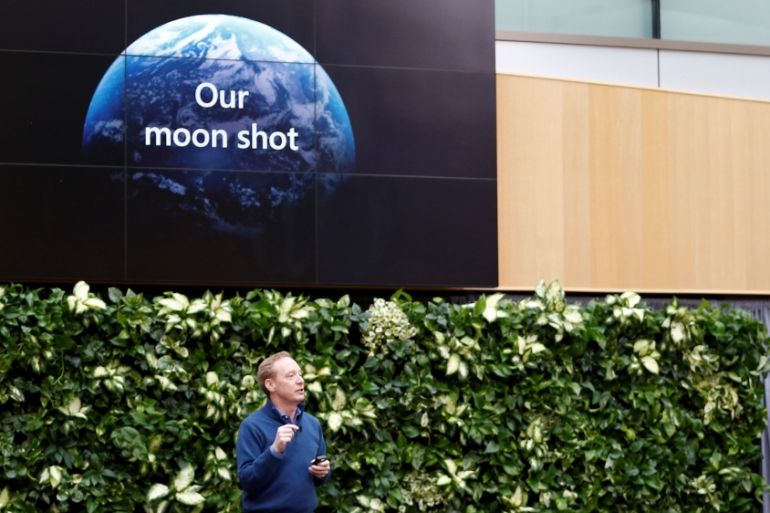Microsoft, Citi, Walmart make corporate climate A list
CDP names 179 firms as business leaders in transparency and action as Japan surpasses US in number of top companies.

Of 8,000 companies given climate action scores from A to F, just 179 – or two percent – received the top grade in a new survey published on Monday.
CDP, a global non-profit driving companies and governments to reduce their greenhouse gas emissions, ranked Alphabet, Citigroup, Microsoft and Walmart among the best corporations in North America for their records on sustainability.
Keep reading
list of 4 itemsPhotos: Sustainable living gives Hungarian families hope for the future
Can ancient tunnels cool 21st-century heat in summer?
Why is Germany maintaining economic ties with China?
With 38 companies in the top tier, Japan beat out the United States – which saw just 35 firms receive a perfect rating.
But with 85, Europe had by far the most A-rated companies. Canada had just one (IGM Financial), while there were two in Latin America (Brazil) and only one in Africa (South Africa).
The annual ratings are designed to cultivate a spirit of competitiveness and raise ambition on climate. At the request of their investors, companies disclose climate data to CDP.
Good marks show comprehensiveness of reporting, awareness of climate-related risks and market-leading best practices – including the use of science-based emissions targets, renewable energy and carbon pricing.
‘Financial sense’
Bruno Sarda, President of CDP North America, said: “While climate change is already upon us, these companies know sustainability presents an exciting race to the top, an opportunity to innovate and rethink business as usual.”
“The good news is that companies are not just doing this because government isn’t, but because it makes good business and financial sense,” Sarda told Al Jazeera. “The evidence is in the way companies are disclosing investments they’re making.”
Profit-seeking enterprises are not just sharing their environmental numbers to save the planet. Climate action appears to have a direct bearing on financial success.

Companies on the A list outperform their peers on the stock market by 5.5 percent every year, according to index provider STOXX.
CDP has released the latest findings to coincide with the kick-off of the World Economic Forum annual gathering in Davos, Switzerland.
One of the top items on the agenda is titled “How to mobilize business to respond to the risks of climate change”.
In 2019, more than 500 investors with $96 trillion in assets requested companies to disclose through CDP – a 20 percent increase over the previous year.
US companies are well-represented on the list, despite inaction by the federal government. Of A-list corporations in North America, 20 are committed to science-based targets aligned with the 2015 international Paris Agreement on climate change.
‘Carbon negative’
Alphabet, Google’s parent company, purchased enough renewable energy to power all global operations in 2017 and 2018, becoming the world’s largest cumulative corporate purchaser of renewables.
Microsoft, for its part, pledged last week to become “carbon negative” by 2030 and offset all carbon emissions it has ever produced. The software giant also promised to launch a $1bn innovation programme for carbon capture technology.
“We’re well positioned to enable and accelerate the low-carbon transition,” said Lucas Joppa, chief environmental officer at Microsoft.
“In the past year, we’ve accelerated on our path to powering our global operations with 100-percent renewable energy,” Joppa added, saying Microsoft has taken steps to improve water efficiency and nearly double the internal carbon price to $15 per metric tonne.

With Adobe’s new Sign service for cloud-based electronic signatures – to replace printing and faxing traditional paperwork – every one million transactions save 27 million gallons (102 million litres) of water, 1.5 million pounds (680,000 kilogrammes) of waste and 23.4 million pounds (10.6 million kg) of CO2 emissions.
Citi has set a 10-year, $100bn environmental finance goal to bankroll and facilitate climate solutions.
Walmart is working with suppliers to cut emissions through Project Gigaton, which aims to slash one billion metric tonnes of greenhouse gas emissions from the company’s value chain over the next decade.
Apple, American Express, Home Depot, Morgan Stanley and Salesforce are among the other A-list firms.
Visa, which just announced reaching the goal of 100-percent renewable energy by 2020, may grow from a B to an A rating next year for its feat in procuring electrons from alternative sources.
“We believe everyone is at their own stage of the sustainability journey,” said Doug Sabo, Visa’s head of Global Corporate Responsibility & Sustainability.
“For Visa, we are proud to be among a small group who has achieved their 100 percent renewable goal,” he told Al Jazeera.
Companies that provide insufficient information or do not disclose at all receive an F grade from CDP.
“When CDP was created, our ambition was to create a link between environmental and financial information, accelerate the shifting of capital in the direction of a low-carbon economy,” Sarda said.
“The announcement by BlackRock is what that looks like,” he said, referring to the asset manager’s decision to move away from fossil fuels, publicly announced last week.
“Climate change,” said Sarda, “is here.”